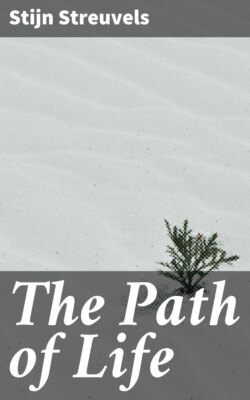Читать книгу The Path of Life - Stijn Streuvels - Страница 9
На сайте Литреса книга снята с продажи.
IV. LOAFING
ОглавлениеTable of Contents
He went, ever on the move, with the slow, shuffling step of wandering beggars who are nowhere at home.
They had discharged him, some time ago, and now he was walking alone like a wild man. For whole days he had dragged himself through the moorland, from farm to farm, looking for his bread like the dogs. Now he came to a wide lane of lime-trees and before him lay the town, asleep. He went into it. The streets lay dead, the doors were shut, the windows closed: all the people were resting; and he loafed. It was dreary, to walk alone like that, all over the country-side, and with such a body: a giant with huge legs and arms, which were doomed to do nothing, and that belly, that craving belly, which he carried about with him wherever he went.
And nobody wanted him: ’twas as though they were afraid of his strong limbs and his stubborn head—because his glowing eyes could not entreat meekly enough—and his blackguardly togs. …
Morning came; the working-folk were early astir. Lean men and pale women, carrying their kettles and food-satchels in their hands, beat the slippery pavements with their wooden shoes. Doors and windows flew open; life began; every one walked with a busy air, knew where he was going; and they vanished here and there, through a big gate or behind a narrow door that shut with a bang. Carts with green stuff, waggons with sand and coal drove this way and that. Fellows with milk and bread went round; and it grew to a din of calls and cries, each shouting his loudest.
And he loafed. Nobody looked at him, noticed him or wanted him. In the middle of the forenoon, a young lady had stared at him for a long time and said to her mother:
“What a huge fellow!”
He had heard her and it did him good. He looked round, but mother and daughter were gone, behind a corner, and stood gazing into a shop full of bows and ribbons.
It began to whirl terribly in his belly; and his stomach hurt him so; and his legs were tired.
The streets and houses and all those strange people annoyed him. He wanted to get away, far away, and to see men like himself: workers without work, who were hungry!
He looked for the narrow alleys and the poor quarter.
Out of a side-street a draycart came jogging along. Half a score of labourers lay tugging in the shoulder-strap or leant with all the force of their bodies against the cart, which rolled on toilsomely. ’Twas a load of flax, packed tightly in great square bales standing one against the other, the whole cart full. The dray caught its right wheel in the grating of an open gutter and remained stock-still, leaning aslant, as though planted there. The workmen racked and wrung to get the wheel out, but it was no good. Then they stood there, staring at one another, at their wits’ end and throwing glances into the eyes of that big fellow who had come to look on. Without saying or speaking, he caught a spoke in either hand, pressed with his mighty shoulder against the inside of the wheel, bent and wrung and in a turn brought the cart on the level. Then he went behind among the other workmen to go and help them shove. They looked at him queerly, as if to say that they no longer needed his help and had rather done without him. The cart rolled on, another street or two, and then through the open gate of the warehouse. The labourers looked into one another’s eyes uneasily, moved about, pulled the bales off the cart and dragged them a little farther along the wall. Then they tailed off, one by one, through a small inner door; and he stood there alone, like a fool. A bit later, he heard them laugh and whisper under their breaths. When he was tired of waiting, he went up the street again.
Nobody, nobody, nobody wanted him!
He ground his teeth and clenched his fists. In the street through which he had to go, on the spaces outside the hotels sat ladies and gentlemen toying with strange foods and sipping their wine out of long goblets. They chattered gaily and tasted and pecked with dainty lips and turned-up noses. The waiters ran here, there, like slaves. Those coaxing smells stung like adders and roused evil thoughts in his brain. His stomach fretted awfully and his empty head turned.
He hurried away.
In a street with windowless house-fronts, a street without people in it, he felt better. He let his body lean against the iron post of a gas-lamp, stuck his hands in his trouser-pockets and stood there looking at the paving-stones. Now he was damned if he would take another step, he would rather croak here like a beast; then they would have to take him up and know that he existed.
The boys coming from school mocked him; they danced in a ring, with him, the big fellow, in the middle. They hung paper flags on his back and sang:
